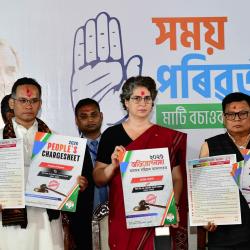Crijaf Sona, a microbial formulation powder used for retting jute fibres, was launched in Guwahati on Monday.
The microbial formulation, developed by the Central Research Institute for Jute and Allied Fibres (CRIJAF), under the Indian Council of Agricultural Research, is expected to increase the income of farmers. Nearly 80,000 farmers are engaged in jute cultivation in Assam and the annual production of jute fibre is 1.3 lakh tonnes.
Retting is the process of extracting fibre from a plant's stem and one way of doing so is the use of micro-organisms and moisture. Water or microbial retting is an old but the most popular process in extracting fine bast fibres. Jute stalks, after harvesting, are tied into bundles and submerged in soft running water. The stalk stays submerged in water for 20 days or less if the quality of jute is better.
Crijaf Sona is applied between the bundles as they are laid on top of each other. It helps to reduce the retting period by six to eight days, improves productivity by eight to 10 per cent and to also improves quality. This leads to additional income of farmers, between Rs 9,000 and Rs 11,000, from one hectare of land as fibre can be extracted easily from the whole plant. Labour cost is also reduced. It does not affect plant, animal, fish or human life.
Principal scientist of the institute, Bijon Mazumdar, said: "Farmers will benefit from this product as 3kg or 4 kg is required per bigha, entailing an investment of around Rs 220 but the return is in thousands. We have been using it on a trial basis in Nagaon, Morigaon and Barpeta and the result is very good. Its use will eliminate discolouring of the fibre."
Next2Nature, a jute-diversified products manufacturing unit, has started manufacturing microbial formulation with support from Guwahati Biotech Park (GBP). Its CEO, Nishant Saraogi, said: "Initially we will manufacture around 1 lakh kg of Crijaf Sona this year. "
- 7554 reads










Add new comment